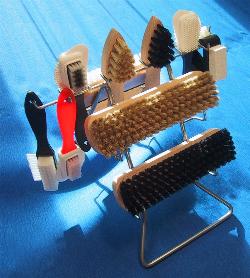Pricing policy
 Price policy – just like all other topics – is a very extensive topic. The statements in this Newsletter are limited to the special factors of price policy for accessories in a specialist retail outlet. In this case several effects can occur, which have an effect on the price sensitivity of the customer. The buyer is less price-sensitive if one of the following effects applies:
Price policy – just like all other topics – is a very extensive topic. The statements in this Newsletter are limited to the special factors of price policy for accessories in a specialist retail outlet. In this case several effects can occur, which have an effect on the price sensitivity of the customer. The buyer is less price-sensitive if one of the following effects applies:Stand-along effect:
The product appears to stand on its own. Many specialist retail outlets have only one make of accessory, thus applying this effect.
Substitution effect:
Substitution products are not well known. The customers in a specialist retail outlet are often not familiar with accessories of similar quality.
Comparative complexity effect:
The customer finds it difficult to make qualitative comparisons. How many customers actually test various shoe polishes and their effect on leather for example?
Partial cost effect:
Expense is small in comparison to the total value of the goods purchased. If the customer buys an expensive shoe then the accessories are always inexpensive in comparison.
All these effects indicate that the demand for accessories tends to be inelastic, i.e. the number of customers demanding the product will only reduce slightly, even at high process or following price rises.**** If both retailers and manufacturers share this knowledge then both will be able to make good profit margins on accessories.
****According to: Harry Zingel (1999-2003): Grundzüge der Preistheorie. Elementare Gedanken der unternehmerischen Preispolitik. www.zingel.de.



